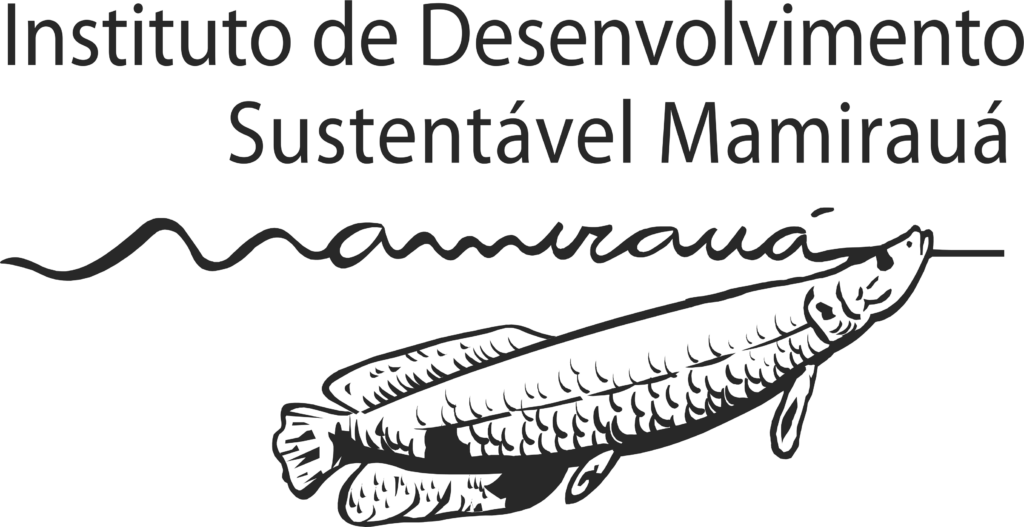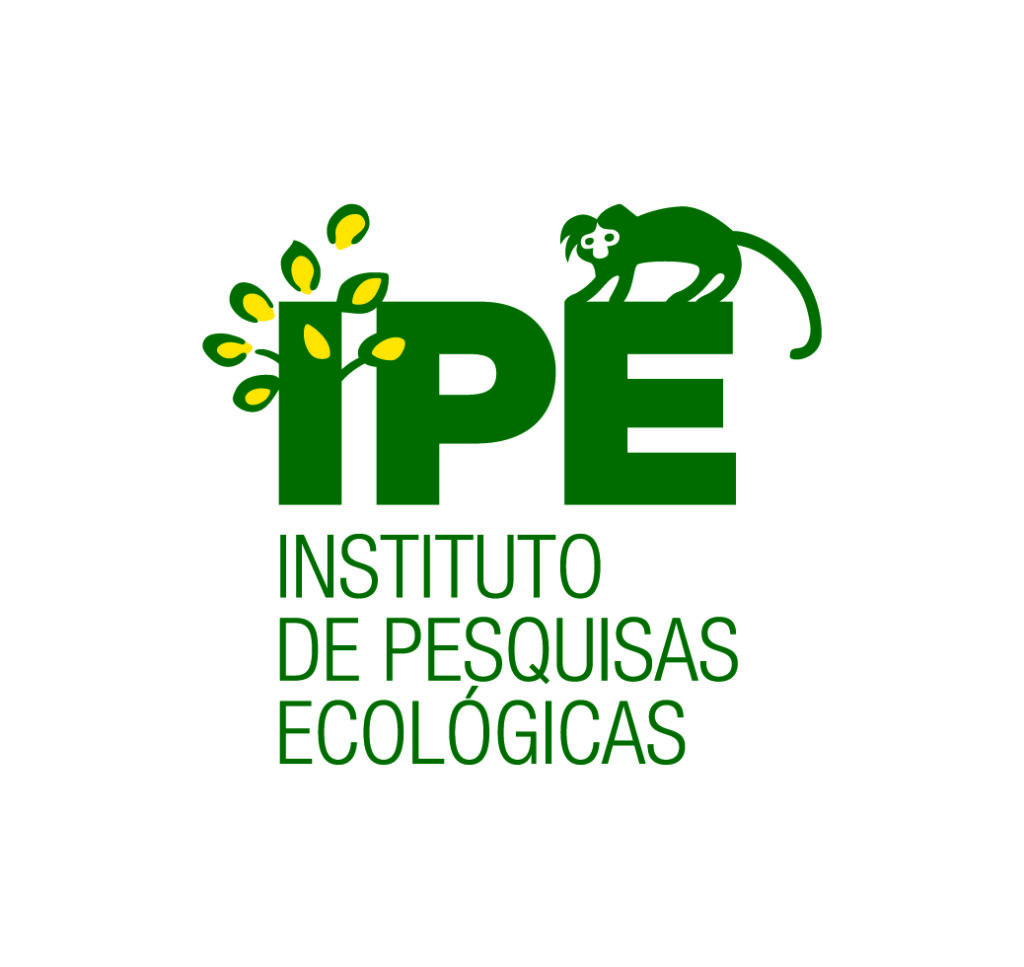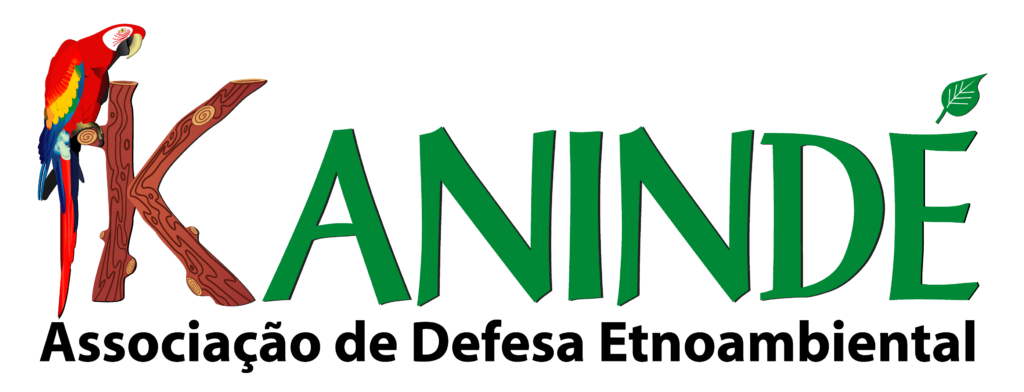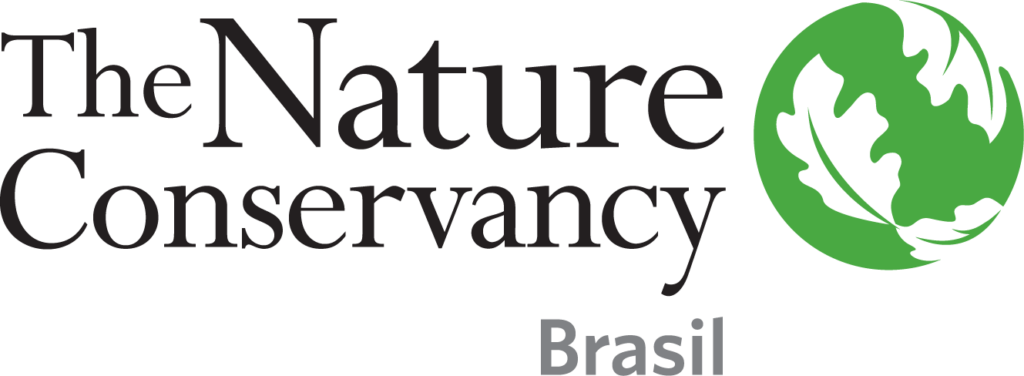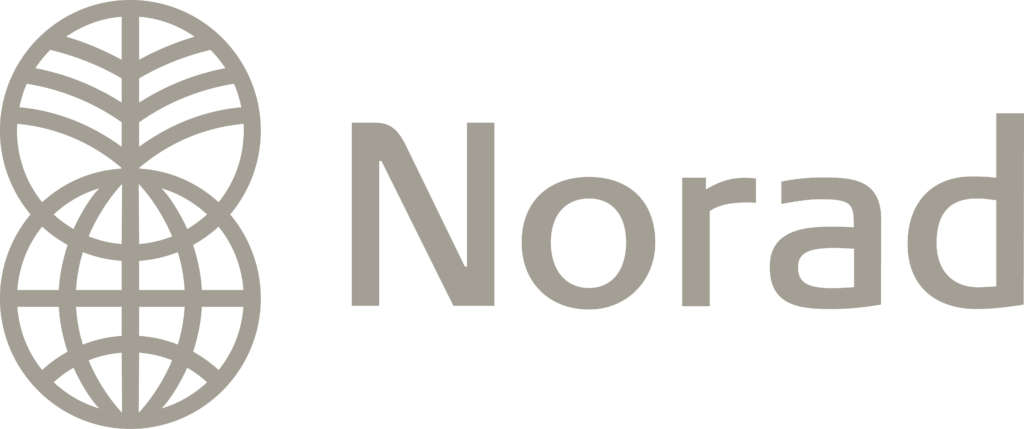

The Proteja Portal is a multi-stakeholder initiative that aims to facilitate society’s engagement in direct and indirect actions to defend, conserve, and promote sustainable development of Brazil’s protected areas.
The Portal was conceived by the following organizations: Amazon Environmental Research Institute (IPAM), Institute of Man and Environment of the Amazon (Imazon), Socioenvironmental Institute (ISA), and Woodwell Climate Research Center.
For your institution to become a Proteja member, contact the Executive Coordination to request approval.
FUNBIO is a private, non-profit civil society organization, established in 1996 with resources from the Global Environment Facility (GEF) and by initiative of the federal government to support the implementation of the Convention on Biological Diversity. It has extensive experience in managing projects and financial assets from international cooperation, private sector donations, and legal obligations of the Brazilian business sector. FUNBIO does not work with resources from the Brazilian public budget. In 2015, it was accredited as a national implementing agency of the GEF and, in 2018, as an agency of the Green Climate Fund (GCF). Since 2018, it has adopted the social and environmental safeguard policies of the International Finance Corporation, IFC.
The Vitória Amazônica Foundation (FVA) is a non-profit civil society organization that has been working for 30 years with socio-environmental innovation at different scales in the Amazon. We develop projects in the areas of research, social organization, education, socioeconomic development, and public policies, focusing on solving local and regional problems through sustainable initiatives aimed at building an alternative development model in the Amazon region. Much more than learning and teaching, FVA has proven the importance and feasibility of a more harmonious relationship between people and nature.
The Institute for Conservation and Sustainable Development of the Amazon (Idesam) is a non-governmental, non-profit organization founded in 2004 in Manaus, capital of the State of Amazonas. Our mission is to promote the valorization and sustainable use of natural resources in the Amazon and seek alternatives for environmental conservation, social development, and climate change mitigation.
The Mamirauá Institute for Sustainable Development was created in April 1999. It is a Social Organization promoted and supervised by the Ministry of Science, Technology and Innovations. Since its inception, the Mamirauá Institute has developed its activities through research programs, natural resource management and social development, mainly in the region of Médio Solimões, in the state of Amazonas.
The objectives of the Mamirauá Institute include applying science, technology and innovation actions in the adoption of strategies and public policies for the conservation and sustainable use of Amazonian biodiversity. They also encompass the construction and consolidation of models for the economic and social development of small riverside communities through the development of socially and environmentally appropriate technologies.
The International Institute of Education of Brazil (IEB) is a Brazilian non-profit association, headquartered in Brasília, founded in November 1998, with the mission of strengthening social actors and their protagonism in building a just and sustainable society. IEB stands out in the national scenario for dedicating itself to training and capacitating people and strengthening organizations in the various aspects and themes related to the environment, development and sustainability.
IFT is a Civil Society Organization of Public Interest (OSCIP), focused on forest issues, which has been operating in the Amazon for over 20 years. From this perspective, it has adopted effective practices for controlling financial resources, achieving a high level of transparency. It is supported by several donors who receive and approve projects that aim to promote good practices of multiple-use forest management in the Amazon.
We were born in 1995, and like every good representative of generation Z, we have special care for the environment, for people and their rights. We believe that the correct use of forests and their resources is the legacy we want to leave in this world. We are a Brazilian NGO founded at a time when concerns about environmental conservation and the best way to use nature’s elements began to echo around the world.
Imazon (Institute of Man and Environment of the Amazon) is a Brazilian research institution whose mission is to promote conservation and sustainable development in the Amazon. We are an organization dedicated to research and the search for solutions to the problems of use and conservation of the Amazon’s natural resources. In 30 years of existence, Imazon has published approximately 700 technical works published as articles in international scientific journals, as well as more than 100 books and booklets that serve as support for decision-making by public authorities, the private sector and civil society.
The Amazon Environmental Research Institute (IPAM) is a scientific, non-governmental, non-partisan and non-profit organization that since 1995 has worked for the sustainable development of the Amazon. Our purpose is to consolidate, by 2035, the tropical development model of the Amazon, through the production of knowledge, implementation of local initiatives and influence on public policies, in order to impact economic development, social equality and environmental preservation.
IPÊ – Institute for Ecological Research is a Brazilian non-profit organization that works for the conservation of the country’s biodiversity, through science, education and sustainable businesses. Founded in 1992, it is headquartered in Nazaré Paulista (São Paulo), where its education center, ESCAS – School of Environmental Conservation and Sustainability, is also located.
Present in the Atlantic Forest, Amazon, Pantanal and Cerrado biomes, the Institute carries out about 30 projects a year, applying the IPÊ Conservation Model, which involves scientific research on species, environmental education, community involvement and mobilization, conservation of habitats and the landscape and support for the construction of public policies. In addition to local projects, the Institute also implements work in various regions, following the themes of Protected Areas, Urban Areas and Research & Development (Natural Capital and Biodiversity).
IPÊ is responsible for planting more than 3 million trees in the Atlantic Forest, directly contributes to the conservation of six species of fauna, carries out environmental education and training for 15,000 people a year, on average. The projects benefit 200 families with sustainable actions and knowledge about environmental conservation.
For the development of socio-environmental projects, the organization counts on partners from all sectors and works as an articulator in fronts that promote engagement and mutual strengthening between socio-environmental organizations, private initiative and government institutions.
The Socioenvironmental Institute (ISA) is a Brazilian civil society organization, non-profit, founded in 1994, to propose integrated solutions to social and environmental issues with a central focus on the defense of social, collective and diffuse goods and rights related to the environment, cultural heritage, human rights and peoples. It is structured in programs that are based on the following lines of action: defense of socio-environmental rights; monitoring and proposal of alternatives to public policies; research, dissemination and documentation of socio-environmental information; development of participatory models of socio-environmental sustainability; and institutional strengthening of local partners.
The Kanindé Ethno-Environmental Defense Association is a Civil Society Organization of Public Interest – OSCIP, non-profit, founded on November 15, 1992, by a group of people who worked with the Uru-eu-wau-wau indigenous people and in the defense of the environment, in Rondônia. Among the main activities developed since its creation, the actions of surveillance and inspection of the Uru-eu-wau-wau Indigenous Land and the Pacaás Novos National Park stand out, as well as the advisory to indigenous organizations, environmental impact assessment, participatory ethno-environmental diagnosis in indigenous lands, rapid ecological assessment, ethno-zoning, indigenous land management plan, environmental education, carbon project development, project preparation and monitoring of public policies.
The Nature Conservancy (TNC) is a global environmental conservation organization dedicated to protecting the lands and waters on which all life depends. Guided by science, TNC creates innovative local solutions to the world’s greatest challenges so that nature and people can thrive together. Working in 72 countries and territories, the organization uses a collaborative approach that involves local communities, governments, the private sector and other partners. In Brazil, where it has been operating for more than 30 years, TNC’s work focuses on solving the complex conservation challenges of the Amazon, Cerrado and Atlantic Forest through a systemic approach, with a focus on implementation and impact generation, to reverse climate change and biodiversity loss.
The Woodwell Climate Research Center is an independent research organization where scientists study the impacts of climate change around the world and work with partners from national governments to corporations to identify and implement opportunities to reduce greenhouse gas levels in the atmosphere. The institution’s scientists have contributed to all IPCC assessment reports and helped launch the United Nations Framework Convention on Climate Change.
The WCS-Brazil Program is a Brazilian non-profit organization founded in 2003. Since its foundation, the organization has focused on conservation efforts in the Pantanal and Amazon regions. WCS-Brazil’s strategy is to identify critical conservation problems and develop scientific and community-oriented solutions that benefit natural landscapes, wildlife and human populations.
WWF-Brazil is a Brazilian civil society organization, nonpartisan and nonprofit, working to defend life. Our purpose is to change the current trajectory of socio-environmental degradation. Created in 1996, it operates throughout Brazil and is part of the WWF Network (World Wide Fund for Nature), present in over 100 countries.

The Research Group on Protected Natural Areas was created in 2011 through the initiative of professors and students from the Federal Institute of Education, Science and Technology of Southeast Minas Gerais – Barbacena Campus, with the goal of becoming a reference in the planning, implementation, and management of Conservation Units and other Protected Areas.
The group is composed of professors, researchers, and interns from different fields of knowledge, aiming to promote a multidisciplinary perspective through socio-environmental actions that foster greater integration between conservation and regional development. The group is certified by IF Sudeste MG and recognized by CNPq.
The Proteja initiative is coordinated by a Deliberative Council with seven representatives from partner non-governmental organizations. The executive coordination plans and executes the council’s decisions with support from the Support Group formed by all partner entities.
The management of the Proteja Portal is overseen by a Curatorial Council composed of professionals appointed by partner organizations and invited experts. This council is responsible for validating publications submitted to the portal to ensure the quality of the information.
Governance Structure
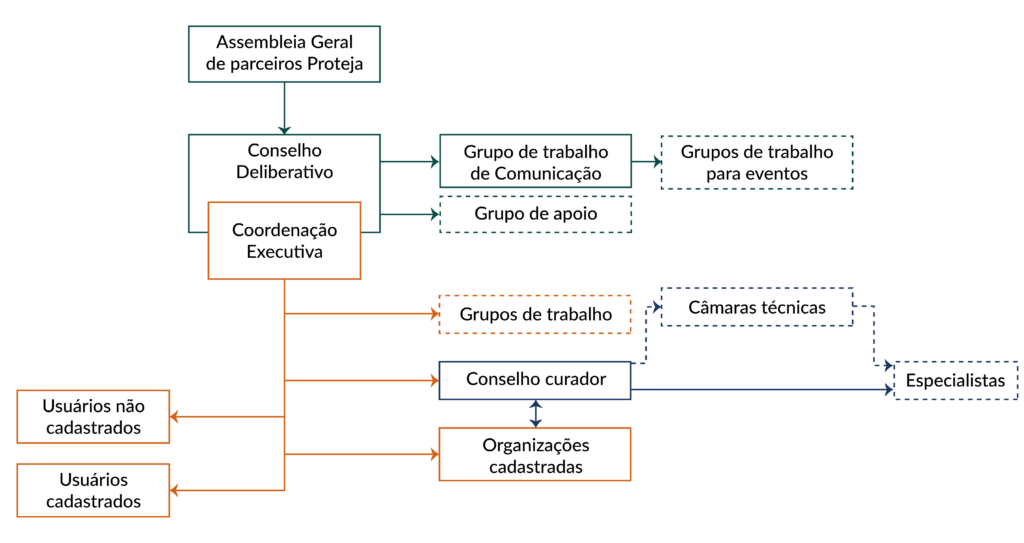
Collaborative Governance – Proteja




